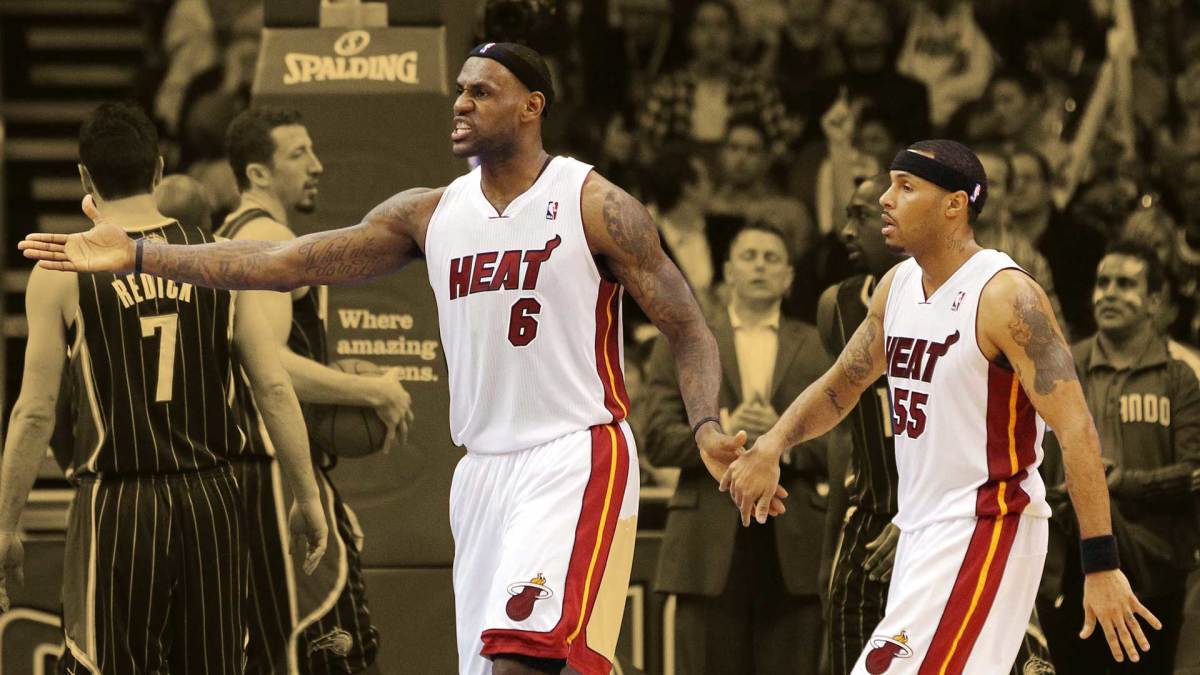It’s silly to think about it now, especially since LeBron James now has four NBA rings and Finals MVP trophies. However, there was a time when fans, analysts and even fellow NBA players questioned whether he had the clutch gene or the intestinal fortitude to deliver when the lights were at their brightest on the biggest stage in professional basketball.
The year was 2011, and James, despite all the backlash from “The Decision,” had lived up to the hype and led the Miami Heat to the cusp of an NBA title. Up 2-1 in the NBA Finals against the Dallas Mavericks, the Heat were 10 minutes away from taking a commanding 3-1 series lead after erecting a 74-65 lead in the fourth.
Advertisement
With a star-studded roster that also had Dwyane Wade and Chris Bosh, some believed the win was in the bag. What followed was an indictment of LeBron’s ability to finish games when the stakes were at their very highest.
LeBron’s performance was puzzling
The Heat had every chance to stomp the Mavericks and put themselves within a win away from hoisting the Larry O’Brien trophy. That clearly didn’t happen as Dirk Nowitzki and Jason Terry came alive in the fourth quarter, where they combined to score all but three of the Mavs’ 21 points in that stretch.
Advertisement
As the final buzzer sounded on Dallas’ incredible 86-83 victory, all eyes weren’t on the victors but on James, who curiously did not score a single point in the game’s final quarter. Despite playing the entirety of the fourth, he shot the ball just once. He finished Game 4 with only eight points on 3-for-11 shooting, which to this day, remains his worst performance in the postseason.
While the Mavericks claimed their switch to zone defense — a defensive scheme rarely utilized in the NBA during that time — stumped LeBron, some Heat players surmised there was a lot more to it than just a defensive call.
Advertisement
According to sharpshooting guard Eddie House, James seemed like a punch-drunk boxer trying his best to stay on his feet in the later rounds of a match; the lights were on, but nobody was home.
“For James, it was almost like, ‘I’m here, but I’m not. My mind is on something else,’ almost like a blank stare at times. Plenty of guys went up to him, ‘Hey, we need you. Come on, let’s go. Let’s go,'” House relayed.
“At times, it was falling on deaf ears because everybody’s coming and telling you the same thing,” the spunky guard continued. “It probably just made him a little bit more numb to whatever the situation was that he was dealing with inside, mentally.”
Advertisement
The issue began in Games 1 and 2 when the seeds of doubt were planted. James was held down to an average of 22.0 points, a far cry from the 31.8 he averaged in the Eastern Conference finals against the Chicago Bulls. In Game 3, he put up only 17 and it was all downhill from there.
Physically, James was there; mentally, he wasn’t.
“In basketball, once you start thinking about things, you’re kind of done,” Heat center Joel Anthony stated. “It wasn’t like James was just missing shots. He was also not having the same aggressiveness that we’re used to.”
Advertisement
Dallas’ zone changed the series
The Mavs’ braintrust knew they wouldn’t stand a chance if they tried to match the Heat’s superstars’ athleticism. So they dug deep and formulated a defensive approach that catered more to their strengths.
“We knew that guarding LeBron and Wade one-on-one was an impossible feat. We had to do something to counteract their athletic ability,” Mavs assistant coach Dwane Casey recalled.
Advertisement
“Against great athletes, you can’t give them rhythm. You have to make them play in crowded spaces. If the Heat were going to beat us, it was going to be from the outside. We played zone mainly in Game 4 and Game 5. But Game 4 gave us more confidence to run it in Game 5. The zone kept them off balance and made them slow down and think,” he added.
With James clearly not playing like himself in that series, the Heat had no chance in the next two games and the Mavericks promptly took advantage, winning them both to capture the championship and gain vengeance for the defeat they suffered to the same squad back in 2006.
As celebrated as Nowitzki was for that finals win, most still remember the showdown more for James’ choke job, which seemed implausible given his immense talent and skill set.
Advertisement
Related: “It happened to me before” – Allen Iverson related to LeBron James’ NBA Finals losses
This story was originally reported by Basketball Network on Sep 14, 2025, where it first appeared in the Old School section. Add Basketball Network as a Preferred Source by clicking here.
